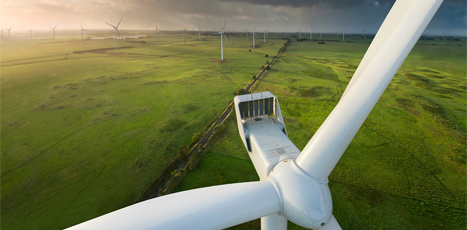The world’s biggest wind turbine manufacturer is joining forces with environmental groups in a global campaign to rouse the “silent majority” of people who support renewable energy to fight back against what it claims is “misinformation” spread by some anti-wind activists that is threatening the industry.
Morten Albaek, senior vice-president of the Danish wind turbine company Vestas, will launch the campaign in Melbourne on Tuesday as anti-wind activists rally in front of Parliament House in Canberra to demand a future Coalition government stop new wind farms and end or scale back the renewable energy target that underpins their operation.
Ken McAlpine, public affairs director for Vestas in Australia, said the highly-unconventional corporate campaign was being launched here because anti-wind groups in Australia had been more successful than in any other country. He accused some of spreading misinformation and using “astroturfing” (fake grassroots) campaigns to persuade politicians to pass legislation making windfarm operations more difficult.
“They don’t observe rules of civilised debate, they are not particularly interested in facts and they have been doing it for years … They have been able to achieve change at a state policy level and there is a risk they will be able to do it at federal level as well,” McAlpine told Guardian Australia.
“Wind energy is the only thing we do and we see this as such a threat to our business that we have to step up and change the game … we are taking some risks and working with people we have never worked with before but we have to do something different because what we have been doing so far hasn’t worked.”
Vestas is working with other wind companies, environmental groups such as Greenpeace and Environment Victoria and activist groups such as GetUp!. They are building an online portal to encourage renewable energy and windfarm supporters to write letters and lobby politicians, and to give them information and contacts to do so. After Australia, the company plans to expand the campaign to Britain, Canada and possibly the United States.
Albaek says there are anti-wind activists around the world who “demonstrate a brazen disregard for fact-based information” and in Australia the “rising anti-wind movement could, if unchecked, lead to additional legislative and regulatory restrictions that will constrain the market and choke off the country’s exceptional wind potential”.
McAlpine says the industry’s biggest problem is that it has “broad support from the silent majority but a tiny minority is running a well orchestrated campaign”. [It has] convinced politicians to change policy and we have to turn the debate around.”
“There are of course people with legitimate questions about windfarms and we have to do better at answering those questions,” McAlpine said. But he said the debate was being led by people who lived nowhere near the locations of the windfarms they were opposing.
“A lot of them are the same groups fighting against any sort of climate action and the tactics are similar to the Tea Party group in the USA. They bully and intimidate supporters of windfarms in rural areas … to get their way.”
As Essential Media poll this month found 76% of people supported building windfarms to generate renewable energy, including 82%cof Labor voters, 71% of Liberal and National party voters and 89% of Greens voters.
As Guardian Australia reported last week, the federal Coalition would impose new noise monitoring rules on windfarms, which the industry says will inflict crippling costs. Shadow ministers argue it is the only way windfarms can maintain sufficient public support to continue operating.
The Coalition’s policy is to maintain the current target of 20% renewable energy by 2020, but several Coalition MPs who believe new windfarms should be banned and the renewable energy target wound back will attend the rally on Tuesday.
People living close to wind farms have reported symptoms including headaches, sleeplessness and nausea, and several residents experiencing the symptoms have given evidence at inquiries. But a recent study by Professor Simon Chapman of the University of Sydney found incidence of the sickness was far more prevalent in communities where anti-windfarm lobbyists had been active. He suggested it might be a psychological phenomenon caused by the belief that turbines make people sick.
Prominent among those against wind power is the chairman of Tony Abbott‘s proposed business advisory council, Maurice Newman, who has called for the renewable energy target to be scrapped because he believes the scientific evidence for global warming and the economic case for renewable energy no longer stack up.
The anti-wind website Stop These Things says the purpose of Tuesday’s rally is to tell a future Coalition government, “Australia simply can’t afford the great wind power fraud.”


